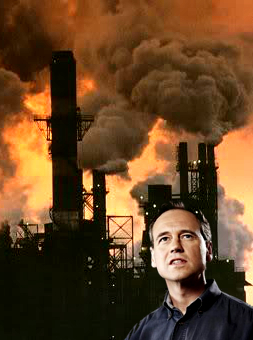Emissions plan will pay low, expect high, deliver little
 The Federal Government has unveiled its white paper on the Emissions Reduction Fund (ERF), a main component of the Direct Action plan to combat climate change.
The Federal Government has unveiled its white paper on the Emissions Reduction Fund (ERF), a main component of the Direct Action plan to combat climate change.
The paper outlines the plan to pay major corporations for their attempts to reduce harmful emissions, but currently contains no penalties for companies that take the money but fail to fix their problems.
The government has not announced any plans to invest in renewable energy, which some say is a signal that its preference lies with fossil fuels, despite their impermanence.
The ERF white paper has been welcomed by some of the groups that could potential receive grants, and condemned by many from the conservation and environmentalist movements.
Environment Minister Greg Hunt says he will write to key Senate crossbenchers to push the bill through Parliament.
The ERF will pay for the cheapest carbon abatement schemes proposed in biennial reverse auctions.
The pay-outs will, twice a year, encourage “practical ways of reducing emissions where every dollar is spent on actually purchasing real means of decreasing Australia's overall emissions,” Mr Hunt said.
The Emissions Reduction Fund will spend $2.55 billion over four years, starting on July 1 with an initial budget of $300 million, which will be expanded to $500 million and then $750 million over three years.
The Prime Minister has indicated that grants will not be paid above the budgeted limits, even if the efforts undertaken fail and Australia missing its emission reduction target of 5 per cent by the year 2020.
The money will be paid to efforts that Mr Hunt describes as “practical actions such as cleaning up waste coal mine gas, cleaning up wasteland fill gas, cleaning up methane, energy efficiency on a significant scale, whether it's industrial, commercial or residential.”
The white paper says Australia faces “a cumulative emissions reduction task of 591 million tonnes of carbon dioxide equivalents in the period to 2020”.
The white paper marks the start of the Coalition government’s renewable energy target (RET), which many companies have already labelled as biased, unscientific, fossil fuel-favouring and “farcical” in reports from the renewable energy media.
Labor and the Greens have slammed the plan, meaning it will face similar legislative hurdle to the repeal of the carbon tax, which remains stalled.
Opposition environment spokesperson Mark Butler says the Direct Action pay-outs are environmentally meaningless.
“It's extraordinary that a policy that was released more than four years ago still has more questions associated with it than answers,” he said.
“This gives us no confidence that Direct Action is a policy that will use taxpayers money wisely or will deliver any substantial reduction in Australia's carbon pollution.”
Lobby groups for the big businesses targeted for emissions reduction say they would prefer to be able to buy into international carbon pricing schemes.
The Business Council and the Australian Industry Group say they want access to credible international permits, arguing that it is an better way to reduce emissions.
The Ai Group has warned that the Federal Government’s Direct Action plan will likely miss its reduction target.
Acting Greens leader Adam Bandt agrees that the policy will be effective only in paying money to polluters.
“The first big flaw in the scheme is that it takes money away from ordinary people and gives it to the country's biggest polluters,” he told the ABC.
“The second big flaw in the scheme is that there's no legal obligation for Australia or Australia's biggest polluters to actually cut their pollution.
“It won't do what it's supposedly designed to do.”







 Print
Print